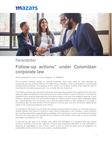
Follow-up actions" under Colombian corporate law
The so-called "tracking shares" or "actions traçantes" have been used for many decades by companies such as General Motors, The Walt Disney Company, AT&T and Alcatel for financial and reorganization purposes. The purpose of this article is to analyze whether they could be used in Colombia for the same purpose and, if so, to study their tax treatment.
The follow-up shares, according to the doctrine, are those aliquot parts of the capital whose economic rights are determined based on the performance of certain assets or lines of business or commercial establishments, whether these belong to the same company or to one of its related companies. These shares, in general, confer the same political rights as ordinary shares (voting rights, inspection rights, etc.), being different from the former only in that the determination of their dividend is not made in accordance with the total results of the company's financial year, but only with those related to the asset or line of business linked to such shares.
An example of the above occurs when the company issues follow-on shares (or converts shares of another species into follow-on shares) to retain certain employees of the company, usually linked to the line of business that is expected to be profitable. Such shares then function as a financial incentive that will only have economic benefits for the holders of the shares if the asset or line of business generates a profitability of its own.
It may also be the case of an investor who, within the framework of a company that has several business activities (commercial, industrial, financial and investment activities), is only interested in obtaining the profitability of one of them, which is why he limits his rights (and his obligations as shareholder) to the income from such asset or business activity.
Although it is more usual for such shares to be linked to a line of business, they can also be linked to an income-producing asset, such as an investment in shares or debt securities, which in turn generate dividends or financial returns in which the holder of the tracking stock would participate. In such a scenario, the use of this type of shares would be for organizational and not financial purposes, since in the end the company's capital would be segregated in "cedulas" or "cells", even though formally the "uniqueness" or "unity" of such item is given.
This division of capital, although atypical, is not entirely contradictory with the rules of traditional corporate law, much less with those of simplified joint stock companies (S.A.S.), which is why this analysis is especially important. In traditional stock corporations (S.A., S.C.A.), although only the types of shares allowed by law (common, preferred, with preferential dividend and without voting rights, etc.) can be issued, the differential payment of the dividend can be regulated through stipulations contained in the corporate contract (art. 150 of the Code of Commerce).
In this sense, although the issuance of follow-on shares would not be possible in these types of companies, it could be the case that through the differential regulation of the dividend an ordinary share similar to the follow-on share could be created. On the contrary, since in the S.A.S. any type of shares can be created without any limitation (art. 10, Law 1258/2008), it is perfectly possible to issue and regulate the follow-on shares in this type of company.
The tax effects of this type of shares, both with respect to the quality of the asset of the holder and the quality of the dividend received, will follow the same general rules of shares and dividends in Colombia.
In no case may these be assimilated to the so-called preferred shares (created in the last tax reform), which -for tax purposes- are considered as a financial asset for whoever holds them and the dividend received is understood as an interest.
This is because it does not share their essential characteristics, nor is it intended (nor could it be the case) that by means of the issuance of tracking stock it is intended to cover up a financing operation.


